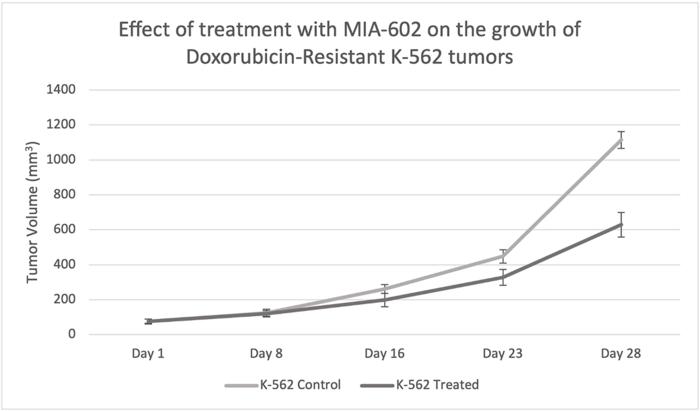
Exploring the role of MIA-602 in overcoming Doxorubicin-resistance in acute myeloid leukemia
“Our results reveal that MIA-602 may be a useful treatment for Doxorubicin-resistant AML […]”

Credit: 2024 Gaumond et al.
“Our results reveal that MIA-602 may be a useful treatment for Doxorubicin-resistant AML […]”
BUFFALO, NY- April 10, 2024 – A new research paper was published in Oncotarget’s Volume 15 on April 8, 2024, entitled, “Exploring the role of GHRH antagonist MIA-602 in overcoming Doxorubicin-resistance in acute myeloid leukemia.”
Acute myeloid leukemia (AML) is characterized by the rapid proliferation of mutagenic hematopoietic progenitors in the bone marrow. Conventional therapies include chemotherapy and bone marrow stem cell transplantation; however, they are often associated with poor prognosis. Notably, growth hormone-releasing hormone (GHRH) receptor antagonist MIA-602 has been shown to impede the growth of various human cancer cell lines, including AML. In this new study, researchers Simonetta I. Gaumond, Rama Abdin, Joel Costoya, Andrew V. Schally, and Joaquin J. Jimenez from the University of Miami, Florida Atlantic University and Veterans Affairs Medical Center, Miami examined the impact of MIA-602 as monotherapy and in combination with Doxorubicin on three Doxorubicin-resistant AML cell lines, KG-1A, U-937, and K-562.
“Given the role of GHRH in multiple cancer types, it is possible that GHRH antagonists may offer an alternative treatment approach for AML as well as drug-resistant AML, which may circumvent the side effects associated with standard chemotherapy.”
The in vitro results revealed a significant reduction in cell viability for all treated wild-type cells. Doxorubicin-resistant clones were similarly susceptible to MIA-602 as the wild-type counterpart. Their in vivo experiment of xenografted nude mice with Doxorubicin-resistant K-562 revealed a reduction in tumor volume with MIA-602 treatment compared to control.
“Our study demonstrates that these three AML cell lines, and their Doxorubicin-resistant clones, are susceptible to GHRH antagonist MIA-602.”
Continue reading: DOI: https://doi.org/10.18632/oncotarget.28579
Correspondence to: Simonetta I. Gaumond
Email: [email protected]
Keywords: leukemia, AML, resistance, growth hormone-releasing hormone, MIA-602
Click here to sign up for free Altmetric alerts about this article.
About Oncotarget: Oncotarget (a primarily oncology-focused, peer-reviewed, open access journal) aims to maximize research impact through insightful peer-review; eliminate borders between specialties by linking different fields of oncology, cancer research and biomedical sciences; and foster application of basic and clinical science.
Oncotarget is indexed and archived by PubMed/Medline, PubMed Central, Scopus, EMBASE, META (Chan Zuckerberg Initiative) (2018-2022), and Dimensions (Digital Science).
To learn more about Oncotarget, visit Oncotarget.com and connect with us on social media:
- X, formerly Twitter
- YouTube
- Spotify, and available wherever you listen to podcasts
Click here to subscribe to Oncotarget publication updates.
For media inquiries, please contact [email protected].
Oncotarget Journal Office
6666 East Quaker Street., Suite 1A
Orchard Park, NY 14127
Phone: 1-800-922-0957 (option 2)
###
Journal
Oncotarget
DOI
10.18632/oncotarget.28579
Method of Research
Experimental study
Subject of Research
Cells
Article Title
Exploring the role of GHRH antagonist MIA-602 in overcoming Doxorubicin-resistance in acute myeloid leukemia
Article Publication Date
8-Apr-2024